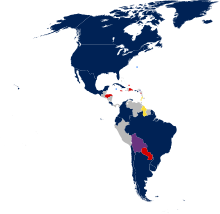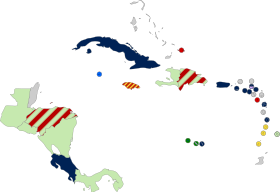
A | B | C | D | E | F | G | H | CH | I | J | K | L | M | N | O | P | Q | R | S | T | U | V | W | X | Y | Z | 0 | 1 | 2 | 3 | 4 | 5 | 6 | 7 | 8 | 9
LGBT rights in the Americas | |
|---|---|
 Status of same-sex marriage and other types of same-sex partnerships in the Americas.
Same-sex marriage1
Other type of registered partnership1
Limited domestic recognition1
Foreign marriages recognized for residency only
Unrecognized
Constitution restricts marriage to opposite-sex couples
Unenforced ban on same-sex sexual activity
1May include recent laws or court decisions which have created legal recognition of same-sex relationships, but which have not entered into effect yet. | |
| Status | Legal in 30 out of 35 states; equal age of consent in 26 out of 35 states Legal in all 21 territories; equal age of consent in 16 out of 21 territories |
| Gender identity | Legal in 13 out of 35 states Legal in 8 out of 21 territories |
| Military | Allowed to serve openly in 14 out of 29 states that have an army Allowed in all 21 territories |
| Discrimination protections | Protected in 22 out of 35 states Protected in 14 out of 21 territories |
| Family rights | |
| Recognition of relationships | Recognized in 11 out of 35 states Recognized in 18 out of 21 territories |
| Restrictions | Same-sex marriage constitutionally banned in 7 out of 35 states |
| Adoption | Legal in 7 out of 35 states Legal in 13 out of 21 territories |
Laws governing lesbian, gay, bisexual, and transgender (LGBT) rights are complex and diverse in the Americas, and acceptance of LGBT persons varies widely.
Same-sex marriages are currently legal in Argentina, Brazil, Canada, Chile, Colombia, Costa Rica, Cuba, Ecuador, Mexico, United States and Uruguay. Free unions that are equivalent to marriage have begun to be recognized in Bolivia. Among non-independent states, same-sex marriage is also legal in Greenland, the British Overseas Territories of the Falkland Islands and South Georgia and the South Sandwich Islands, all French territories (Guadeloupe, Martinique, Saint Barthélemy, French Guiana, Saint Martin, and Saint Pierre and Miquelon), and in the Caribbean Netherlands, while marriages performed in the Netherlands are recognised in Aruba, Curaçao and Sint Maarten. More than 800 million people live in nations or sub-national entities in the Americas where same-sex marriages are available.
In January 2018, the Inter-American Court of Human Rights ruled that the American Convention on Human Rights recognizes same-sex marriage as a human right.[1] This has theoretically made the legalisation of such unions "mandatory" in Barbados, Bolivia, Chile, Costa Rica, the Dominican Republic, Ecuador, El Salvador, Guatemala, Haiti, Honduras, Mexico, Nicaragua, Panama, Paraguay, Peru and Suriname. The Supreme Courts of Honduras,[2] Panama,[3] Peru[4] and Suriname[5] have rejected the IACHR ruling, while the Supreme Courts of Costa Rica and Ecuador adhered to it. Argentina, Brazil, Colombia, and Uruguay are also under the court's jurisdiction, but already had same-sex marriage before the ruling was handed down.
However, five other nations still have unenforced criminal penalties for "buggery" on their statute books.[6] These are Grenada, Guyana, Jamaica, Saint Lucia, and Saint Vincent and the Grenadines, of which Guyana is on mainland South America, while the rest are Caribbean islands. They are all former parts of the British West Indies. In addition, in Anguilla, the Bahamas, the Cayman Islands, Paraguay, Montserrat, Suriname and the Turks and Caicos Islands, the age of consent is higher for same-sex sexual relations than for opposite-sex ones, and in Bermuda, the age of consent for anal sex is higher than that for other types of sexual activities.
Religion and LGBT acceptance
The British, French, Spanish and Portuguese colonists, who settled most of the Americas, brought Christianity from Europe. In particular, the Roman Catholic Church and the Protestants, both of which oppose legal recognition of homosexual relationships. These were followed by the Eastern Orthodox church,[7] the Methodist Church,[8][9] and some other Mainline (Protestant) denominations, such as the Reformed Church in America[10] and the American Baptist Church,[11] as well as conservative evangelical organizations and churches, such as the Evangelical Alliance and the Southern Baptist Convention.[12][13][14] Pentecostal churches, such as the Assemblies of God,[15] as well as restorationist churches (like Jehovah's Witnesses and Mormons), also take the position that homosexual sexual activity is ‘sinful’.[16][17]
However, other denominations have become more accepting of LGBT people in recent decades, including the Episcopalian church in the United States, the Evangelical Lutheran Church (also in America), the Evangelical Lutheran Church of Canada, the Anglican Church of Canada, the United Church of Canada, the United Church of Christ, the Unitarian Universalist Association, and the Society of Friends (Quakers), as well as some congregations of the Presbyterian Church in America. Most of these denominations now perform same-sex weddings or blessings. Furthermore, many churches in the United Methodist Church (in the US) are choosing to officiate and bless same-sex marriage despite denomination-wide restrictions.[18] In addition, in the United States, conservative Judaism, reform Judaism, and reconstructionist Judaism now welcome LGBT worshippers and perform same-sex weddings.
| Country | Pollster | Year | For | Against | Don't Know/Neutral/No answer/Other |
|---|---|---|---|---|---|
| Ipsos | 2023 | 71%[19] | 24% | 6% | |
| Ipsos | 2023 | 69%[19] | 22% | 9% | |
| Ipsos | 2023 | 74%[19] | 17% | 9% | |
| CADEM | 2022 | 70%[20] | 28% | 2% | |
| Ipsos | 2023 | 53%[19] | 40% | 7% | |
| Ipsos | 2023 | 60%[19] | 34% | 6% | |
| Ipsos | 2023 | 51%[19] | 42% | 7% | |
| Ipsos | 2023 | 64%[19] | 26% | 10% | |
| Equipos Consultores | 2013 | 52%[21] | 39% | 9% | |
| Equilibrium Cende | 2023 | 48%[22] (55%) |
39% (45%) |
13% |
 Marriage Other type of partnership Country subject to IACHR ruling Unrecognized Constitution limits marriage to opposite-sex couples Same-sex sexual activity illegal, though penalties not enforced |
 Same-sex marriage Other type of partnership Unregistered cohabitation Country subject to IACHR ruling No recognition of same-sex couples Constitution limits marriage to opposite-sex couples Same-sex sexual activity illegal but law not enforced |
 Same-sex marriage Binding domestic court ruling establishing same-sex marriage, but marriage is not yet provided for Other type of partnership Unregistered cohabitation No recognition of same-sex couples Constitutional ban on same-sex marriage Same-sex sexual activity illegal but penalties not enforced Island subject to IACHR ruling |
Legislation by country or territory
North America
| LGBT rights in: | Same-sex sexual activity | Recognition of same-sex unions | Same-sex marriage | Adoption by same-sex couples | LGB people allowed to serve openly in military | Anti-discrimination laws concerning sexual orientation | Laws concerning gender identity/expression | Lack of a Presence of Anti-LGBT laws |
|---|---|---|---|---|---|---|---|---|
(Overseas Territory of the United Kingdom) |
+ UN decl. sign.[6] |
|||||||
+ UN decl. sign.[6][26] |
Civil unions in Quebec (2002);[28] Adult interdependent relationships in Alberta (2003);[29] Common-law relationships in Manitoba (2004)[30] |
|||||||
(Autonomous Territory within the Kingdom of Denmark) |
+ UN decl. sign.[6] |
joint adoption since 2016[43] |
||||||
+ UN decl. sign.[6] |
||||||||
(Overseas collectivity of France) |
+ UN decl. sign.[6] |
|||||||
+ UN decl. sign.[6] |
Civil unions in Vermont (2000), Connecticut (2005), New Jersey (2007), New Hampshire (2008), Illinois (2011), Rhode Island (2011), Delaware (2012), Hawaii (2012) and Colorado (2013). |
Transgender people have been allowed to serve openly since 2021.[61] "Transvestites" are currently banned from the military since 2012.[62] Most openly Intersex people may be banned from the military under the Armed Forces ban of "hermaphrodites".[62] |
More extensive protections exist in 23 states, DC, and some municipalities. Conversion therapy for minors is banned in 22 states, DC, and some municipalities. Sexual orientation is covered by the federal hate crime law since 2009. |
Nonbinary gender markers are available, under varying circumstances, in 25 states + DC. Employment discrimination on the basis of gender identity is prohibited nationwide since 2020. More extensive protections exist in 22 states, DC, and some municipalities. Gender identity is covered by the federal hate crime law since 2009. |
Central America
| LGBT rights in: | Same-sex sexual activity | Recognition of same-sex unions | Same-sex marriage | Adoption by same-sex couples | LGB people allowed to serve openly in military | Anti-discrimination laws concerning sexual orientation | Laws concerning gender identity/expression | Lack of a Presence of Anti-LGBT laws |
|---|---|---|---|---|---|---|---|---|
+ UN decl. sign.[6] |
Has no military | |||||||
+ UN decl. sign.[6] |
||||||||
+ UN decl. sign.[6] |
||||||||
+ UN decl. sign.[6] |
||||||||
+ UN decl. sign.[6] |
||||||||
+ UN decl. sign.[6] |
Has no military |
Caribbean
| LGBT rights in: | Same-sex sexual activity | Recognition of same-sex unions | Same-sex marriage | Adoption by same-sex couples | LGB people allowed to serve openly in military | Anti-discrimination laws concerning sexual orientation | Laws concerning gender identity/expression | Lack of a Presence of Anti-LGBT laws |
|---|---|---|---|---|---|---|---|---|
(Overseas Territory of the United Kingdom) |
Age of consent discrepancy + UN decl. sign.[6] |
|||||||
(Constituent country of the Kingdom of the Netherlands) |
+ UN decl. sign.[6] |
|||||||
Age of consent discrepancy + UN decl. sign.[6] |
||||||||
Civil Unions proposed.[91] |
||||||||
(a special municipality of the Netherlands) |
+ UN decl. sign.[6] |
|||||||
(Overseas Territory of the United Kingdom) |
+ UN decl. sign.[6] |
|||||||
(Overseas Territory of the United Kingdom) |
Age of consent discrepancy[6] + UN decl. sign. |
|||||||
+ UN decl. sign.[6] |
||||||||
(Constituent country of the Kingdom of the Netherlands) |
+ UN decl. sign.[6] |
|||||||
+ UN decl. sign.[6] |
||||||||
+ UN decl. sign.[6] |
||||||||
Penalty: 10-year prison sentence (not enforced). [107] Legalization proposed[108] |
Has no military | |||||||
(Overseas department of France) |
+ UN decl. sign.[6] |
|||||||
